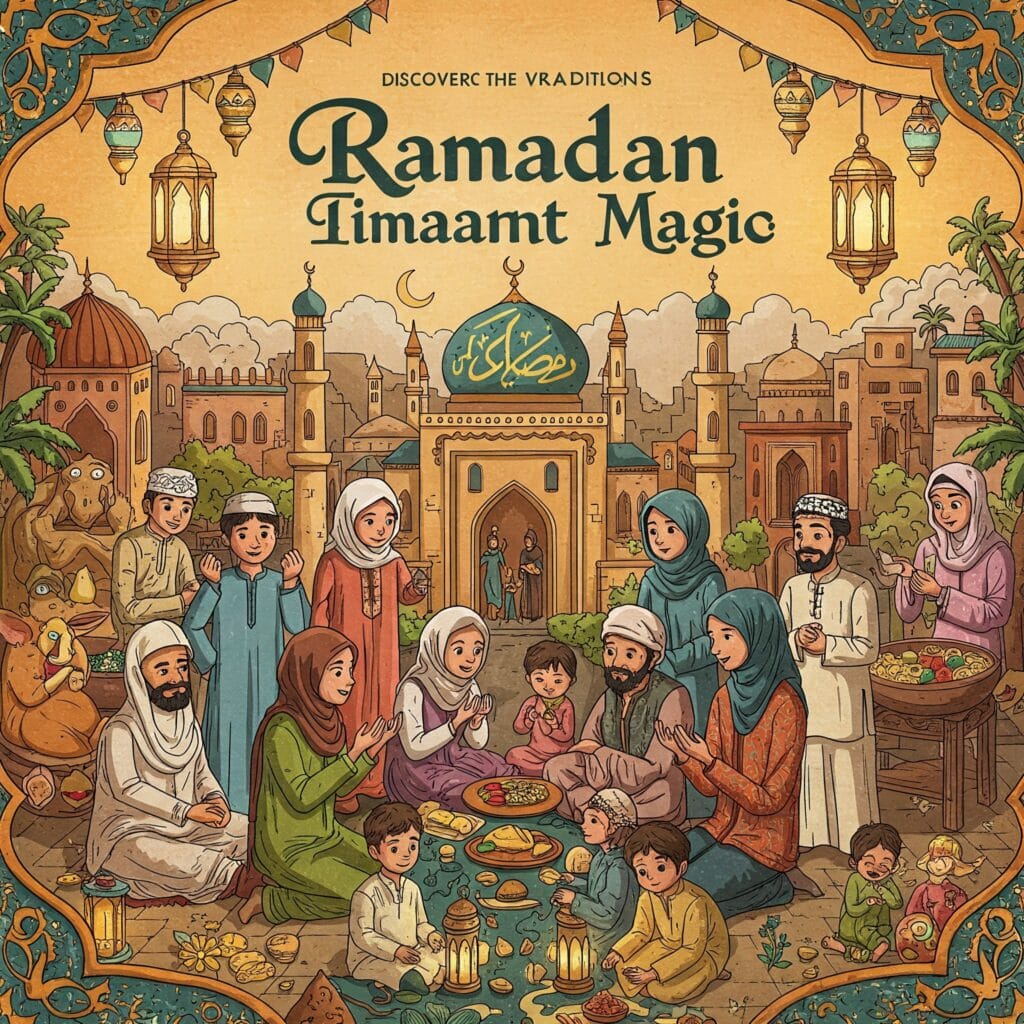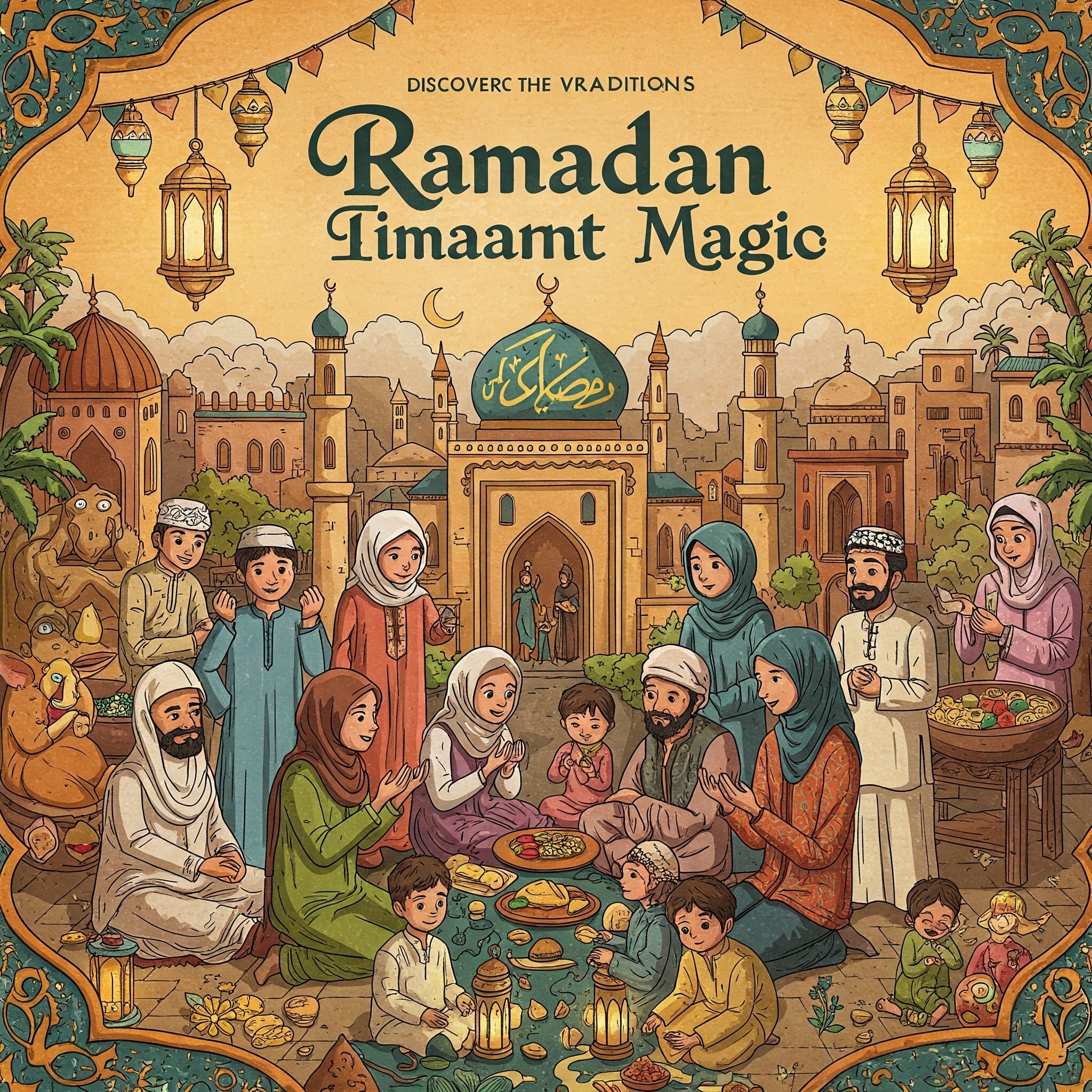Ramadan, the ninth month of the Islamic lunar calendar, is a sacred time for over 1.9 billion Muslims, uniting them in fasting, prayer, and devotion as mandated by the Quran. While the core practices of Ramadan—fasting from dawn to sunset, reciting the Quran, and seeking taqwa (God-consciousness)—are universal, its celebration is enriched by diverse cultural traditions and local practices across the globe. In 2025, as technology and globalization shape communal worship, these unique expressions of Ramadan reflect both spiritual unity and cultural diversity. This in-depth article explores Ramadan’s global traditions and practices, highlighting distinctive customs from various regions, their Quranic roots, and their significance in modern contexts. By examining theological foundations, showcasing regional variations, and addressing contemporary trends, we aim to celebrate the rich tapestry of Ramadan worldwide.

Theological Foundations of Ramadan
Quranic Mandate for Ramadan
The Quran establishes Ramadan as a month of spiritual discipline and divine guidance:
“O you who have believed, decreed upon you is fasting as it was decreed upon those before you that you may become righteous.” [Al-Baqarah 2:183]
This verse emphasizes fasting’s role in fostering taqwa, uniting Muslims globally in a shared pursuit of righteousness. Another verse highlights Ramadan’s significance:
“The month of Ramadan [is that] in which was revealed the Quran, a guidance for the people and clear proofs of guidance and criterion…” [Al-Baqarah 2:185]
This connects Ramadan to Quran recitation, a universal practice enriched by local traditions.
Universal Practices
Core Ramadan practices, rooted in the Quran and Sunnah, include:
- Fasting (Sawm): Abstaining from food, drink, and desires from dawn to sunset, per Al-Baqarah 2:183.
- Taraweeh Prayers: Nightly prayers reciting the Quran, as encouraged by the Prophet (Sahih al-Bukhari 1905).
- Charity (Zakat and Sadaqah): Sharing wealth with the needy, per Al-Baqarah 2:110.
- Dua and Dhikr: Seeking forgiveness and blessings, like the dua “Allahumma innaka ‘afuwwun…” (Sunan Ibn Majah 3850).
These practices form the foundation for global Ramadan observances, adapted through cultural lenses.
Ramadan Traditions and Practices Around the World
Middle East
Saudi Arabia
- Tradition: Qarqe’an, a festive night where children collect sweets in colorful bags, singing traditional songs, especially on the 15th night of Ramadan.
- Practice: Grand iftars in Masjid al-Haram, Mecca, with thousands sharing dates and Zamzam water, reflecting Al-Ma’idah 5:2’s call for communal righteousness.
- Significance: Reinforces community bonding and generosity, with live taraweeh broadcasts fostering spiritual unity, per Al-Baqarah 2:185.
United Arab Emirates
- Tradition: Majlis gatherings, where families host open iftars in decorated tents, serving traditional dishes like harees and luqaimat.
- Practice: Quran recitation competitions, inspired by Al-Baqarah 2:185, held in mosques and broadcast on TV.
- Significance: Promotes hospitality and intellectual engagement with the Quran, blending tradition with modern media.
South Asia
Pakistan
- Tradition: Sehri drummers (dholwalas) wake communities for pre-dawn meals with rhythmic beats, a pre-Islamic custom adapted for Ramadan.
- Practice: Bazaars like Karachi’s Burns Road offer iftar delicacies, with families donating food to the poor, per Al-Baqarah 2:110.
- Significance: Strengthens communal ties and charity, ensuring the needy are included in Ramadan’s blessings.
India
- Tradition: Iftar markets in Old Delhi, like Jama Masjid, serve kebabs and biryani, attracting diverse crowds.
- Practice: Interfaith iftars, where Muslims and non-Muslims share meals, embodying Al-Hujurat 49:13’s call for mutual understanding.
- Significance: Fosters inclusivity and cultural exchange, aligning with Ramadan’s universal values.
Southeast Asia
Indonesia
- Tradition: Bedug drumming, where large drums signal suhoor and iftar, a blend of Islamic and Javanese culture.
- Practice: Takjil markets offer sweet snacks like kolak for iftar, with mosques hosting tadarus (group Quran reading), per Al-Baqarah 2:185.
- Significance: Enhances communal worship and local identity, making Ramadan accessible and festive.
Malaysia
- Tradition: Buka puasa bazaars, like those in Kuala Lumpur, sell nasi lemak and kuih for iftar, drawing diverse crowds.
- Practice: Moreh, post-taraweeh communal meals at mosques, encourage social bonding, per Al-Ma’idah 5:2.
- Significance: Combines spiritual discipline with cultural vibrancy, promoting unity and generosity.
Africa
Egypt
- Tradition: Fanous lanterns decorate streets and homes, symbolizing Ramadan’s light, a Fatimid-era custom.
- Practice: Mawlid tables, public iftar spreads for the poor, reflect Al-Baqarah 2:110’s emphasis on charity.
- Significance: Blends historical tradition with social welfare, ensuring Ramadan’s blessings reach all.
Morocco
- Tradition: Nafar trumpeters announce suhoor, waking communities with melodic calls.
- Practice: Harira soup and chebakia sweets dominate iftars, with mosques hosting Quran memorization circles, per Al-Baqarah 2:185.
- Significance: Reinforces spiritual focus and communal care, rooted in Morocco’s Maliki heritage.
Europe and North America
United Kingdom
- Tradition: Multicultural iftars in London, like those at Trafalgar Square, feature dishes from Turkish to South Asian cuisines.
- Practice: Open mosque events, inspired by Al-Hujurat 49:13, invite non-Muslims to learn about Ramadan, paired with charity drives, per Al-Baqarah 2:110.
- Significance: Promotes interfaith dialogue and community service, adapting Ramadan to a diverse society.
United States
- Tradition: Potluck iftars in communities like Dearborn, Michigan, blend Arab, African, and American dishes.
- Practice: Ramadan night markets, like those in California, offer halal food and Quran recitations, per Al-Baqarah 2:185.
- Significance: Creates inclusive spaces for worship and cultural expression, strengthening Muslim identity in the diaspora.
Other Regions
Turkey
- Tradition: Mahya lights, Quranic verses displayed between minarets, illuminate Istanbul’s mosques.
- Practice: Iftar cannons signal the end of the fast, a tradition from Ottoman times, paired with communal prayers, per Sahih al-Bukhari 1905.
- Significance: Combines spiritual symbolism with historical pride, enhancing Ramadan’s communal spirit.
Nigeria
- Tradition: Tafsir sessions, where scholars explain the Quran in local languages like Hausa, draw large crowds.
- Practice: Sadaqah meals for orphans, per Al-Baqarah 2:110, ensure inclusivity in iftars.
- Significance: Deepens Quranic understanding and social equity, reflecting Ramadan’s universal call.
Prophetic Guidance and Universal Practices
The Prophet Muhammad (peace be upon him) set the framework for Ramadan’s practices, which global traditions adapt:
- Simplicity in Iftar: He broke his fast with dates and water (Sahih al-Bukhari 1957), a practice universal across cultures.
- Generosity: He said, “Whoever provides iftar for a fasting person has a reward like his…” [Jami’ at-Tirmidhi 807], inspiring global charity.
- Taraweeh and Quran: His emphasis on nightly prayers (Sahih al-Bukhari 1905) unites Muslims, from Indonesia’s tadarus to Egypt’s recitation circles.
These prophetic practices anchor diverse traditions, ensuring Ramadan’s spiritual core remains intact.
Contemporary Contexts in 2025
Global Trends
- Digital Ramadan: Apps like Muslim Pro and Ramadan Legacy offer fasting timers, dua reminders, and virtual taraweeh, aligning with Al-Baqarah 2:185. Social media platforms share global iftar recipes, fostering unity.
- Interfaith Engagement: Events like the UK’s Trafalgar Square iftar and US mosque open days, per Al-Hujurat 49:13, promote understanding, inviting non-Muslims to join.
- Sustainable Ramadan: Eco-friendly iftars in Malaysia and Canada use biodegradable plates, reflecting Al-Baqarah 2:205’s call to avoid harm to the earth.
- Charity Innovation: Online zakat platforms like Zakatify streamline giving, per Al-Baqarah 2:110, supporting global causes like refugee aid.
Challenges
- Commercialization: Lavish iftar buffets in some regions contradict the Prophet’s simplicity (Sahih al-Bukhari 1957). Scholars via IslamQA advocate moderation.
- Cultural Dilution: Overemphasis on food or festivities risks overshadowing Al-Baqarah 2:183’s focus on taqwa. Community leaders promote Quran-centric practices.
- Accessibility: Rural areas in Africa or Asia lack resources for communal iftars. Mobile apps and charity drives bridge gaps, per Al-Ma’idah 5:2.
Practical Benefits of Ramadan Traditions
Spiritual Unity
Global practices like taraweeh and Quran recitation, per Al-Baqarah 2:185, deepen taqwa, uniting Muslims in shared worship.
Cultural Preservation
Traditions like Egypt’s fanous or Indonesia’s bedug drumming preserve heritage, fostering pride and identity, per Al-Hujurat 49:13.
Social Cohesion
Communal iftars and charity, per Al-Ma’idah 5:2, strengthen bonds, reducing isolation in diverse societies.
Interfaith Harmony
Open iftars in the West, per Al-Hujurat 49:13, build bridges, dispelling misconceptions about Islam.
Common Misconceptions and Clarifications
Misconception 1: Ramadan Is Uniform Globally
Myth: All Muslims celebrate Ramadan identically. Clarification: While Al-Baqarah 2:183 mandates fasting, cultural traditions like Qarqe’an or fanous vary, reflecting Al-Hujurat 49:13’s diversity.
Misconception 2: Cultural Traditions Dilute Ramadan
Myth: Local customs undermine Ramadan’s spirituality. Clarification: Traditions like sehri drummers enhance engagement, as long as they align with Al-Baqarah 2:185’s focus on Quran and taqwa.
Misconception 3: Ramadan Excludes Non-Muslims
Myth: Ramadan is only for Muslims. Clarification: Interfaith iftars, per Al-Hujurat 49:13, welcome all, fostering mutual respect, as seen in India and the UK.
Misconception 4: Modern Practices Weaken Tradition
Myth: Apps and virtual events reduce Ramadan’s authenticity. Clarification: Digital tools support Al-Baqarah 2:185’s goals, making worship accessible, per the Prophet’s adaptability (Sahih al-Bukhari 1905).
Practical Steps to Engage with Global Ramadan Traditions
To experience Ramadan’s global diversity:
- Explore Local Customs: Join Qarqe’an in the Gulf or fanous decorating in Egypt, reflecting Al-Hujurat 49:13’s diversity.
- Attend Communal Iftars: Participate in mosque or public iftars, like those in Malaysia’s bazaars, per Al-Ma’idah 5:2.
- Use Digital Tools: Track fasting and dua with Muslim Pro, enhancing Al-Baqarah 2:185 practices.
- Learn Quran Locally: Join tafsir sessions in Nigeria or recitation circles in Morocco, per Al-Baqarah 2:185.
- Share Charity: Donate via Zakatify to global causes, per Al-Baqarah 2:110, inspired by Egypt’s mawlid tables.
- Host Interfaith Iftars: Organize inclusive meals, like those in the US, per Al-Hujurat 49:13, to build harmony.
- Practice Sustainability: Use eco-friendly iftar supplies, per Al-Baqarah 2:205, following Canada’s model.
- Document Traditions: Share your Ramadan practices on social media, inspired by global trends, to celebrate unity.
Conclusion
Ramadan around the world is a vibrant mosaic of faith and culture, uniting Muslims through fasting and Quran recitation, per Al-Baqarah 2:183, while celebrating diversity, per Al-Hujurat 49:13. From Saudi Arabia’s Qarqe’an to Indonesia’s bedug drumming, unique traditions enhance spiritual engagement, charity, and community. In 2025, digital tools, interfaith iftars, and sustainable practices amplify Ramadan’s impact, despite challenges like commercialization. By embracing these global practices, Muslims and non-Muslims alike can experience Ramadan’s universal call to righteousness, fulfilling the Quranic promise:
“Indeed, those who have believed and done righteous deeds—the Most Merciful will appoint for them affection.” [Maryam 19:96]
Must read:
- Unlock the Transformative Secret: Ramadan’s Faith Ignites Unshakable Patience and Self-Control!
- Discover the Life-Changing Magic: Quranic Duas Unleash Transformative Blessings for a Brighter Future!
- Exploring the Empowering Reality: Women’s Rights and Roles in Islamic Prayer, Clarifying Misconceptions
Frequently Asked Questions (FAQs)
u003cstrongu003eWhat makes Ramadan practices diverse?u003c/strongu003e
Al-Hujurat 49:13’s diversity allows cultural traditions like fanous or bedug drumming, while Al-Baqarah 2:183 unifies fasting.
u003cstrongu003eAre cultural traditions Islamic?u003c/strongu003e
If aligned with Al-Baqarah 2:185’s focus on taqwa, traditions like sehri drummers enhance Ramadan, per scholarly consensus.
u003cstrongu003eHow do non-Muslims participate?u003c/strongu003e
Interfaith iftars, per Al-Hujurat 49:13, welcome all, as seen in India and the UK, fostering understanding.
u003cstrongu003eDo modern apps replace tradition?u003c/strongu003e
No, apps like Muslim Pro support Al-Baqarah 2:185’s goals, making fasting and dua accessible, per Sahih al-Bukhari 1905.
u003cstrongu003eWhy emphasize charity in Ramadan?u003c/strongu003e
Al-Baqarah 2:110 and Jami’ at-Tirmidhi 807 encourage generosity, reflected in global practices like sadaqah meals.
u003cstrongu003eHow do rural Muslims celebrate?u003c/strongu003e
Charity drives and apps bridge gaps, ensuring Al-Ma’idah 5:2’s communal spirit reaches all, per modern initiatives.


Post Comment